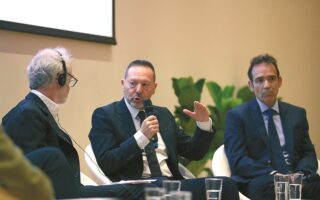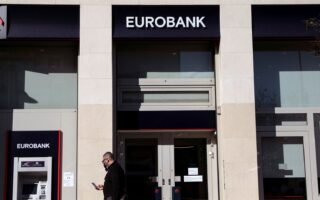A triple stress test for Europe

During the global financial crisis of 2007-9, the US government and the Federal Reserve subjected US banks to a stress test. The idea was to test banks in severe – but hypothetical – recession scenarios in which they would have to show they were adequately capitalized, thereby restoring the confidence of depositors and investors. In his memoirs, Barack Obama talks at length about this risky tactic, which was nevertheless successful and helped stabilize the US financial system and the US economy in general.
EU authorities followed the same tactics with similar stress tests on European banks during the eurozone crisis, as we did in Greece at the beginning of our crisis. I remember the anxiety at the time – in an environment of capital flight from the country – that Greek banks would pass the test successfully; they did, and that helped to avoid a bank run in the first period of the crisis – something we did not avoid in 2015. Since that time, stress tests have now become an integral part of banking supervision exercises in both the EU and the US.
The logic of stress tests is also useful in the current context, but with a different scope and a different logic. I would say that we need to prepare ourselves at the European level for a triple stress test: political, economic and geopolitical.
First stress test at European level: purely political. Following the electoral success of far-right parties in the European Parliament elections, EU leaders have decided to re-nominate Ursula von der Leyen for president of the European Commission. A sensible proposal, but one that is “business as usual” in a politically unprecedented environment that is now characterized, inter alia, by the victory of the far-right in the French elections.
So what happens if – in a general atmosphere of distrust – this proposal is for the first time not adopted by the European Parliament (let’s not forget that the election margin five years ago was only nine votes)? What is the alternative proposal that will signal to citizens that European leaders have both taken the messages of the elections and are choosing someone who can lead the EU at a critical time when so much is at stake? And how will the new Commission – and the Council and Parliament – deal with the challenge from the now powerful anti-European far-right on both policies and values?
Second stress test: an economic one. France, Europe’s second largest economy, is entering a prolonged tailspin with Marine Le Pen’s party having repeatedly stated that it does not intend to respect European rules on fiscal discipline. At the same time, the political and economic weakness of Europe’s erstwhile economic engine, Germany, is visible, while in Italy the Meloni government is failing to control the high levels of Italian public debt.
How will the new Commission and the Council and Parliament deal with the challenge from the now powerful anti-European far-right on both policies and values?
What would happen if suddenly the markets decided that the risk of holding bonds had shot up? What if we are faced with a “sudden stop” – but this time with some of the largest European economies at the center of it, rather than small countries like Greece, Ireland and Portugal? Do we have the right policy tools to avoid another major financial crisis?
The third stress test is geopolitical and is by far the most dangerous. Let’s imagine the scenario: Democrats in the US are unable to come up with an alternative candidate with a better chance of winning the election, and Trump is re-elected US president in November. He immediately announces an end to support for Ukraine, a new trade war with China, and the withdrawal of the US from the institutions of global governance (as he had already done by withdrawing from the Paris Climate Agreement). The result? An advance by Russia, the global economy going into recession, and efforts to preserve common global goods such as jointly addressing climate change, avoiding the next pandemic, or maintaining a global internet infrastructure being challenged.
These three scenarios are a form of stress test for European leaders; even more, they are a form of stress test for democracy, peace and prosperity. Are we then going full speed ahead toward disaster? Not necessarily. But the political response to such real risks is far from the one we need today. Europe is taking small, timid steps forward (and sometimes steps backward) when it needs giant leaps forward.
Issues such as a common European defense, massive investment in European common goods, the rapid transition to a zero-emission economy, the completion of the European common capital market, European lending and common resource instruments, policies to promote the EU’s “strategic autonomy,” but also to tackle widening inequalities, marginalization and the concomitant challenge to democratic institutions are certainly on the political agenda. But real progress on each of these, and more generally on deeper European integration capable of underpinning the EU’s international role, remains frustrated, the result of the perceived need to maintain delicate equilibria but also because of a lack of political courage. And time is running out.
George Papaconstantinou is professor and dean at the European University Institute, and former finance minister of Greece.





